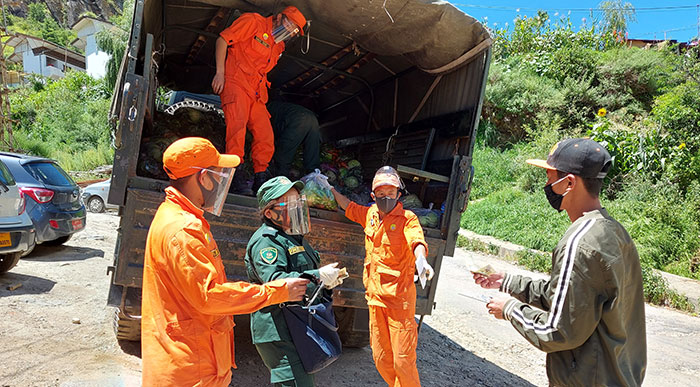Choki Wangmo
As soon as the government announced the nationwide lockdown last month, the first thing people did was check their kitchens for essential items like vegetables. Then they called for deliveries, congesting the network and paralysing the organisations faced with the shortage of human resources.
When the Thimphu thromde couldn’t grapple with the mounting vegetable orders in the backdrop of disgruntled public, foresters volunteered to carry out the tedious job for the rest of the lockdown.
Ugyen Tshering was one of the volunteers along with 46 others from the forest department. They reported at the Centenary Farmers Market (CFM) at eight in the morning and delivered until as late as nine at night.
Although they were well-informed about safety protocols when people came in droves, he said personal protection was secondary to the service delivery.
“When there are a number of people desperate to grab their share, your priority is the work and not safety.”
“If at all there was community transmission, contacting the virus was inevitable,” he said, adding that the heat, rain, and fatigue added to the problem.
The team also faced challenges in identifying the address of people, which therefore caused delays in delivery.
A woman placed an order and said she lived in a tall white building, behind the pink one, a kilometre of rough road, from the main road in upper Motithang. It took an hour for the team to locate her.
This problem eased in the next few days with the introduction of the zoning system. “In the beginning, nothing was organised, everyone was learning. We ran out of vegetables and everyone was desperate,” Ugyen Tshering said.
Later, the team also recorded the places and shops in the GPS system, which would make the process much easier if the country goes into another lockdown, he said. “Next time, it would be calmer, organised, and systematic.”
Daily, the four coordinators of the vegetable delivery team received about 500 phone calls and when it couldn’t be answered, frustrated people took onto social media to vent about the shortcomings of the service.
People also took chances to collect and hoard as much vegetables as possible. He said at times two people from a household came to buy the vegetables.
In the first phase, the department deployed 26 people and 20 in the second phase in case of emergencies with the first batch. The team started delivering in the outskirts of the city and then in town areas. However, the demand was much lesser in the rural areas like Begana since they were self-sufficient.
The lone female volunteer in the first batch of the delivery team, Jamyang Choden, said that she was inspired by the King, personal duty, and responsibility to volunteer although her mother was worried about her safety.
She was trained as a frontline worker for Covid-19 duty. She said that despite putting their best, complaints were aplenty. “People didn’t understand the real situation on the ground, I was demotivated.”
Moreover, due to lack of resources, the team couldn’t cover the areas as designated. The products were damaged. The farmers mixed other vegetables like cucumbers with chillies to weigh more.
The overall coordinator of the delivery team, Kinley Tshering said that there were two parallel operations run simultaneously—managed by dzongkhag administration in the outskirts of the town and the other managed by thromde in the town areas—creating price differences between the two.
“In the future, the zone should be clear and one organisation should coordinate the delivery in both dzongkhag and the thromde to avoid discrepancies,” he said.
He said that as the lockdown eased, independent shops were delivering at different rates, creating public outrage. Since the demand for tomatoes and onions was high, he said there was a need to match producers with consumers and the need to identify sites of production.
When the team went out for deliveries in shops, they were often closed, he said. Orders were placed with toll-free number 1009 in thromde, from which it is shared with the delivery team.
But there were issues with phone numbers and addresses. For example, they were to deliver at Nam shop as per thromde list but after hours of looking for the shop, the team realised it was Sonam shop.
Shopkeepers placed orders with the thromde and there was a huge logistic problem and time loss, Kinley Tshering said.
He recommended the need for close coordination within the systems.
In case of another lockdown, he said those shops who either cancel or place orders wrongly should be blacklisted next time from placing orders.
The team also faced issues in movement. Although the team was in field dress, he said the police didn’t allow them to move in places, delaying the delivery.
“The task force needs to look into such systemic issues for smooth delivery.”
The agriculture department sourced the vegetables and was sorted by the Department of Agriculture Marketing and Cooperatives.
On September 6, with the easing of lockdown, the team handed over the facilities to the vendors at the CFM. During the lockdown, the team had transacted vegetable sourcing and delivery worth Nu 18 million.


